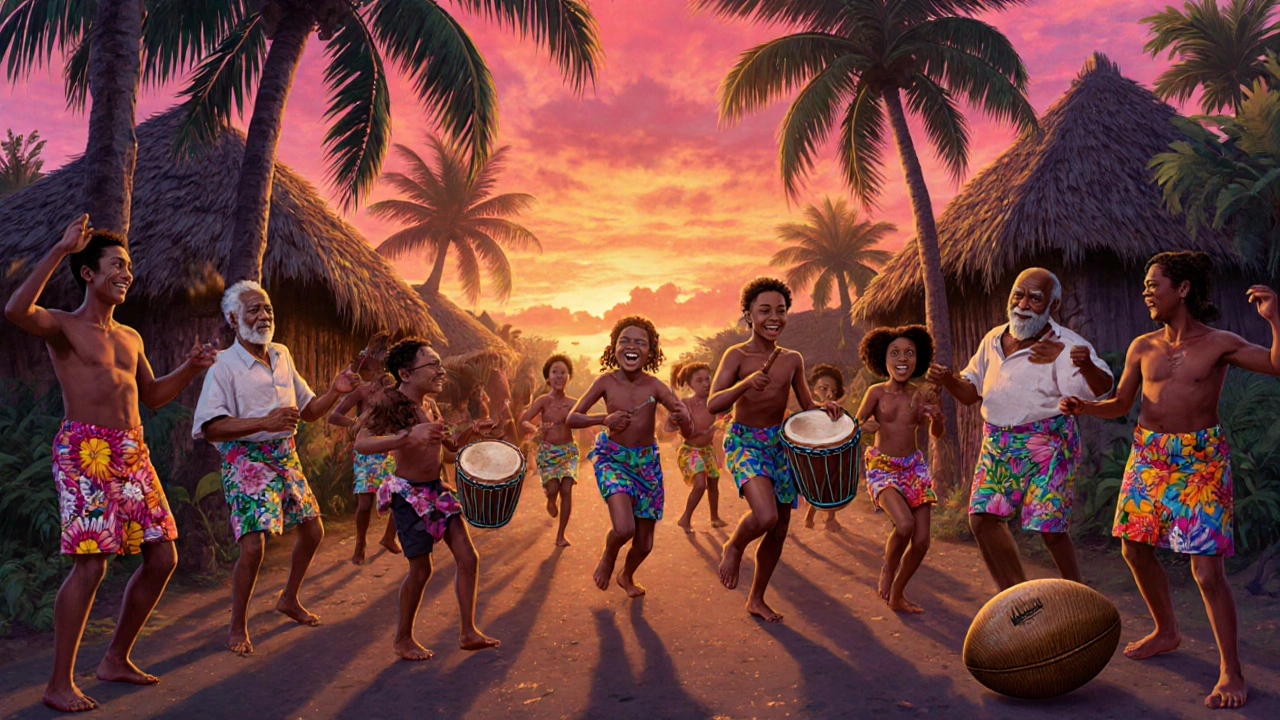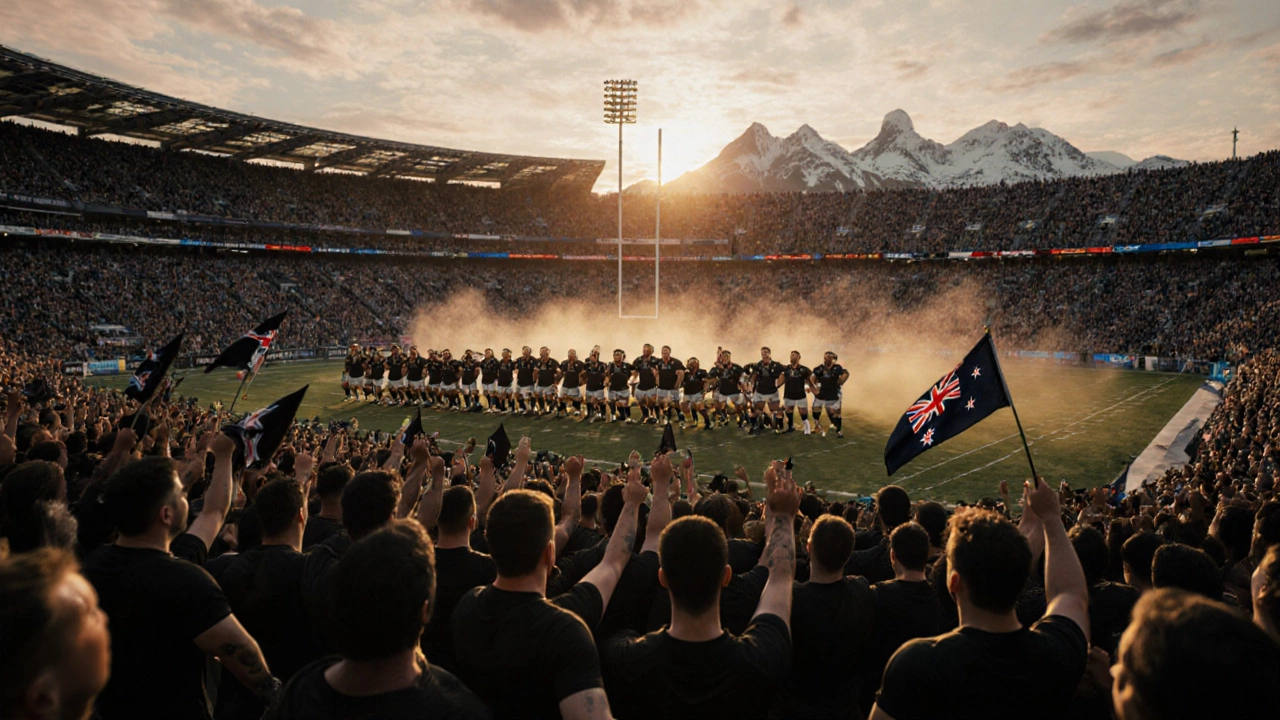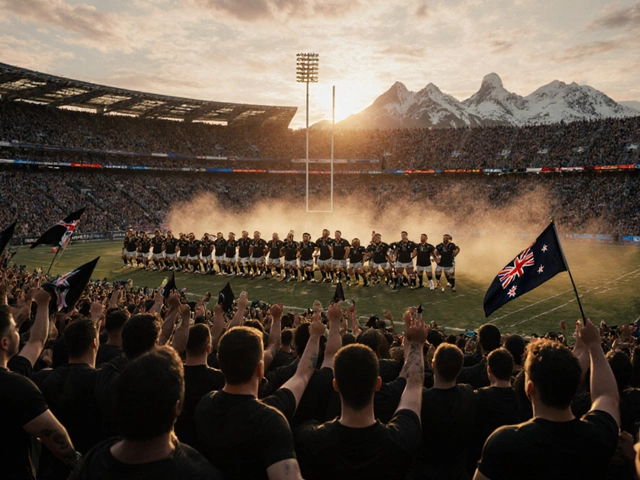Rugby Popularity Comparison Tool
Compare Rugby Popularity Across Nations
Select countries to see how rugby is woven into their national identity through key metrics including World Cup wins, cultural significance, and participation rate.
Rugby Popularity Comparison
Rugby is more than a sport—it's a cultural force. In countries where it's truly popular, rugby becomes part of the national identity, fostering community, resilience, and shared pride.
Rugby isn’t just a sport in some places-it’s part of the air people breathe. On any given Saturday in New Zealand, entire towns shut down. In Wales, schoolkids grow up knowing the lyrics to their national anthem before they can tie their cleats. This isn’t about rankings or trophies. It’s about identity. So where does rugby truly live? Not just where it’s played, but where it’s loved like family.
New Zealand: The Heartbeat of Rugby
New Zealand doesn’t just play rugby. It breathes it. The All Blacks are more than a team-they’re a national ritual. Before every match, the haka isn’t a performance. It’s a declaration. A connection to ancestors, a challenge to the opponent, a moment of unity for millions watching from living rooms to remote villages. The sport here isn’t confined to stadiums. It’s in schoolyards, on beaches, in backyards. Nearly every kid in the country tries their hand at it. The national team has won three Rugby World Cups, but more than that, they’ve built a culture where winning isn’t the goal-excellence is. The player-to-population ratio is unmatched. One in every 150 New Zealanders plays rugby at some level. That’s not statistics. That’s religion.
South Africa: Rugby as Reconciliation
In South Africa, rugby was once a symbol of division. Then came 1995. The World Cup final at Ellis Park. Nelson Mandela, wearing a Springbok jersey, handed the trophy to Francois Pienaar. That moment didn’t just win a game-it began healing a nation. Today, rugby is still deeply emotional. The Springboks have won four World Cups, tying with New Zealand. But the passion goes deeper than trophies. In townships and rural areas, kids play with makeshift balls and broken boots. The sport gives structure, pride, and a path forward. It’s not uncommon to see entire communities gathering around a single TV set during a Springbok match. The roar after a try isn’t just excitement-it’s collective release.
England: The Birthplace with a Legacy
Rugby was born in 1823 at Rugby School in Warwickshire. England still holds that legacy. The national team, the Red Roses and the men’s side, carry centuries of tradition. While they haven’t won a World Cup since 2003, their domestic league-the Premiership-is one of the most competitive in the world. Clubs like Saracens, Leicester Tigers, and Bath have fanbases that rival Premier League football teams. The Six Nations Championship is treated like a holy war. A win against Wales or France isn’t just a victory-it’s a story passed down. Attendance at Twickenham regularly hits 80,000. That’s not just rugby fans. That’s a nation showing up.
Wales: Passion in Every Note of the Anthem
Wales has a population of just 3.1 million. Yet, it punches far above its weight. The Welsh national team has won 28 Five/Six Nations titles. When the national anthem, Hen Wlad Fy Nhadau, is sung in a packed Principality Stadium, it’s not just a pre-game ritual. It’s a tidal wave of emotion. Voices rise together. Tears flow. The crowd sings louder than the band. Rugby in Wales isn’t a pastime. It’s the soundtrack to national pride. Every small town has its local club. Parents drive hours to watch their kids play in U12 matches. The game is woven into the fabric of daily life-on the radio, in pubs, in schools. Even when the team loses, the pride doesn’t fade. Because in Wales, it’s not about winning every time. It’s about showing up, every time.
Fiji: Rugby as a National Lifeline
Fiji is a tiny island nation with less than a million people. But its rugby team? It’s a global powerhouse. The Fiji 7s team has dominated the World Rugby Sevens Series for over a decade. When they win, the entire country stops. Schools close. Businesses shut down. Streets fill with dancing, singing, drumming. Rugby is the only thing that unites Fiji’s diverse ethnic groups. For many young Fijians, rugby isn’t a dream-it’s a lifeline. A good performance can mean a scholarship, a job, a way out of poverty. The national team doesn’t just represent Fiji. It represents hope. Their style? Fast, fearless, joyful. They play like they’re running from nothing-and toward everything.

France: Drama, Talent, and Unpredictability
France is where rugby meets theater. The French national team, Les Bleus, is known for its flair, its passion, and its occasional chaos. They’ve won the Six Nations multiple times and reached World Cup finals. But what makes France unique is the intensity of its domestic scene. Top clubs like Toulouse and Clermont Auvergne draw crowds of 20,000+ regularly. The Top 14 league is one of the most physically demanding in the world. French fans don’t just watch-they scream, they argue, they celebrate like it’s a revolution. The sport is deeply tied to regional identity. In the south, near the Pyrenees, rugby is almost a religion. In Paris, it’s the elite’s sport. And yet, it’s still the one thing that brings everyone together.
Australia: Power, Precision, and the Wallabies
Australia’s Wallabies are one of the most consistent teams in history. Two World Cup wins, countless international trophies. The game thrives in Queensland and New South Wales, where schoolboy rugby is a rite of passage. The Super Rugby competition used to be the pinnacle of Southern Hemisphere rugby. Though it’s changed, the passion hasn’t. Australian fans are loud, loyal, and brutally honest. Win? They’ll sing your name. Lose? They’ll tell you why-loudly. The culture is built on grit. The training grounds are tough. The expectations are higher. And the players? They’re raised to believe they’re never the underdog.
Japan: The Rise of the Brave Blossoms
Japan’s rugby story is one of the most inspiring in modern sports. Before 2015, few outside Asia took them seriously. Then came the 2015 World Cup. Japan beat South Africa 34-32. The world stopped. In 2019, Japan hosted the World Cup-the first time it was held in Asia. Over 2 million tickets sold. Stadiums filled with fans in cherry blossom colors. The national team, the Brave Blossoms, didn’t just compete-they captivated. Rugby in Japan is growing fast. Schools now have rugby programs. Corporations sponsor teams. The Japan Rugby League One is professional and fiercely competitive. It’s not about tradition. It’s about ambition. And it’s working.
Italy: The Underdogs with Grit
Italy may not win often, but they never stop trying. Their entry into the Six Nations in 2000 changed the game. They’ve never won the tournament, but they’ve beaten top teams like France and Scotland. Italian rugby is rooted in the north-regions like Veneto and Lombardy. Clubs like Benetton Treviso and Zebre Parma are the backbone. The national team plays with heart, not just skill. Their fans travel thousands of miles to support them. In Italy, rugby isn’t the biggest sport-but for those who play, it’s everything.

Argentina: The Pumas and the Passion
Argentina’s Pumas are the only non-European team to regularly compete in the Six Nations. They’ve beaten top-ranked teams like Wales, Ireland, and South Africa. The game exploded in Argentina after their historic win over England in 2007. Now, rugby is a major sport in the provinces of Buenos Aires, Tucumán, and Córdoba. Kids grow up watching Pumas matches on dusty TV screens. The national team’s identity is fierce, physical, and proud. They don’t have the budget of New Zealand or England. But they have something more valuable-unbreakable spirit.
Other Nations Making Waves
Scotland has a passionate fanbase and a rich history. Ireland’s team, built on strong provincial clubs like Munster and Leinster, is a consistent top-four contender. Georgia is becoming a powerhouse in the forwards, dominating the Rugby Europe Championship. Samoa and Tonga continue to produce world-class talent despite limited resources. Even the United States and Canada are growing-especially with the rise of Major League Rugby. Rugby is no longer just a sport of the British Isles and the Southern Hemisphere. It’s becoming global.
Why These Countries? The Common Thread
What ties New Zealand, South Africa, Wales, Fiji, and Japan together? It’s not just medals or funding. It’s community. It’s history. It’s identity. In each of these places, rugby isn’t just something you watch. It’s something you are. It teaches discipline, resilience, teamwork. It gives kids a reason to show up. It gives adults a reason to believe. It turns strangers into brothers. That’s why, no matter the score, people keep coming back.
Is rugby popular in the United States?
Rugby is growing in the U.S., but it’s still a niche sport compared to football or basketball. Major League Rugby (MLR) has 14 professional teams across the U.S. and Canada, with attendance rising each year. College rugby is strong, especially at schools like Cal, BYU, and Dartmouth. The U.S. national team, the Eagles, has improved significantly and made the 2023 Rugby World Cup. But the real growth is at the grassroots level-youth clubs, high school programs, and women’s rugby are expanding fast.
Why is rugby so big in New Zealand and not in other English-speaking countries?
In New Zealand, rugby became the national sport because it was accessible, affordable, and tied to identity. Cricket and football were dominant in places like Australia and England, but rugby filled a cultural gap in NZ. It was played in rural towns, schools, and among Māori communities, giving it deep roots. Other countries had other sports that were already established. New Zealand didn’t-so rugby became everything.
Do African countries outside South Africa play rugby?
Yes. Namibia regularly qualifies for the Rugby World Cup and has produced standout players. Kenya is known for its 7s team, which competes globally. Uganda, Zimbabwe, and Tanzania have growing club scenes. Rugby in Africa is often tied to education and military programs. It’s not as funded as in the Southern Hemisphere, but the passion is there. Many African players now play professionally in Europe because of the opportunity.
What’s the difference between rugby union and rugby league?
Rugby union has 15 players per side, more stoppages, and is played worldwide. Rugby league has 13 players, faster play, and fewer stoppages. League is dominant in parts of Australia (especially New South Wales and Queensland), England (Northern counties like Yorkshire and Lancashire), and Papua New Guinea. Union is the version played in the World Cup and Six Nations. League has its own World Cup too, but union gets more global attention.
Which country has the most rugby players?
England has the highest number of registered rugby players-over 2 million. But New Zealand has the highest participation rate per capita. Fiji has more than 10% of its population playing regularly. Japan has seen explosive growth, with over 1 million players. Numbers vary by how you count (youth, amateur, school). But when it comes to sheer volume, England leads. When it comes to heart, Fiji and New Zealand lead.
Where Is Rugby Headed Next?
Rugby is no longer a sport of just a few countries. It’s spreading. The 2027 World Cup will be held in the United States. That’s not a fluke. It’s a strategy. With growing interest in women’s rugby, sevens, and youth programs, the game is expanding faster than ever. Countries like Brazil, Chile, and the Philippines are investing in development. The next generation of stars won’t just come from Wellington or Pretoria. They’ll come from Mumbai, Mexico City, and Manila. Rugby’s future isn’t about who’s won the most. It’s about who’s willing to play.


